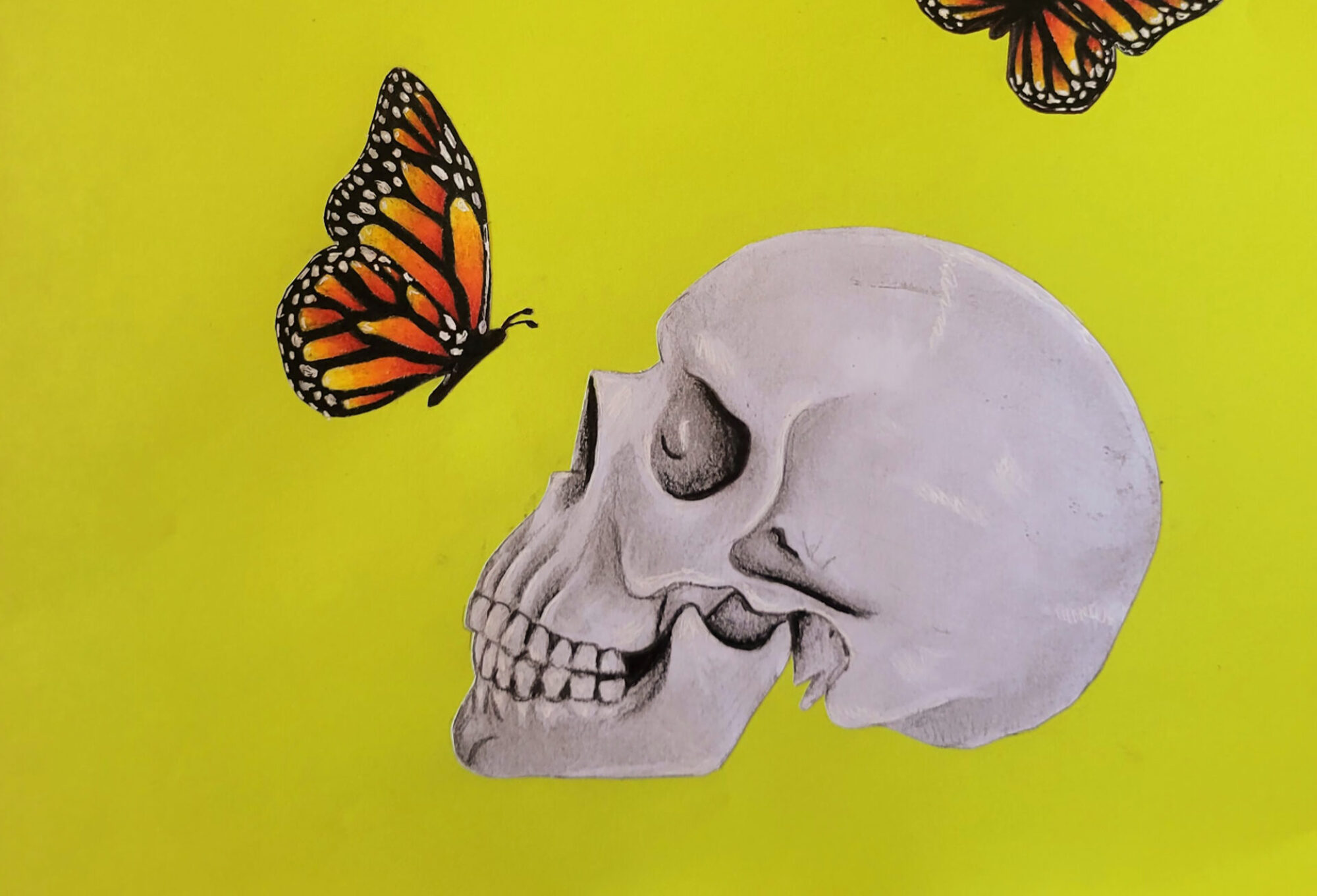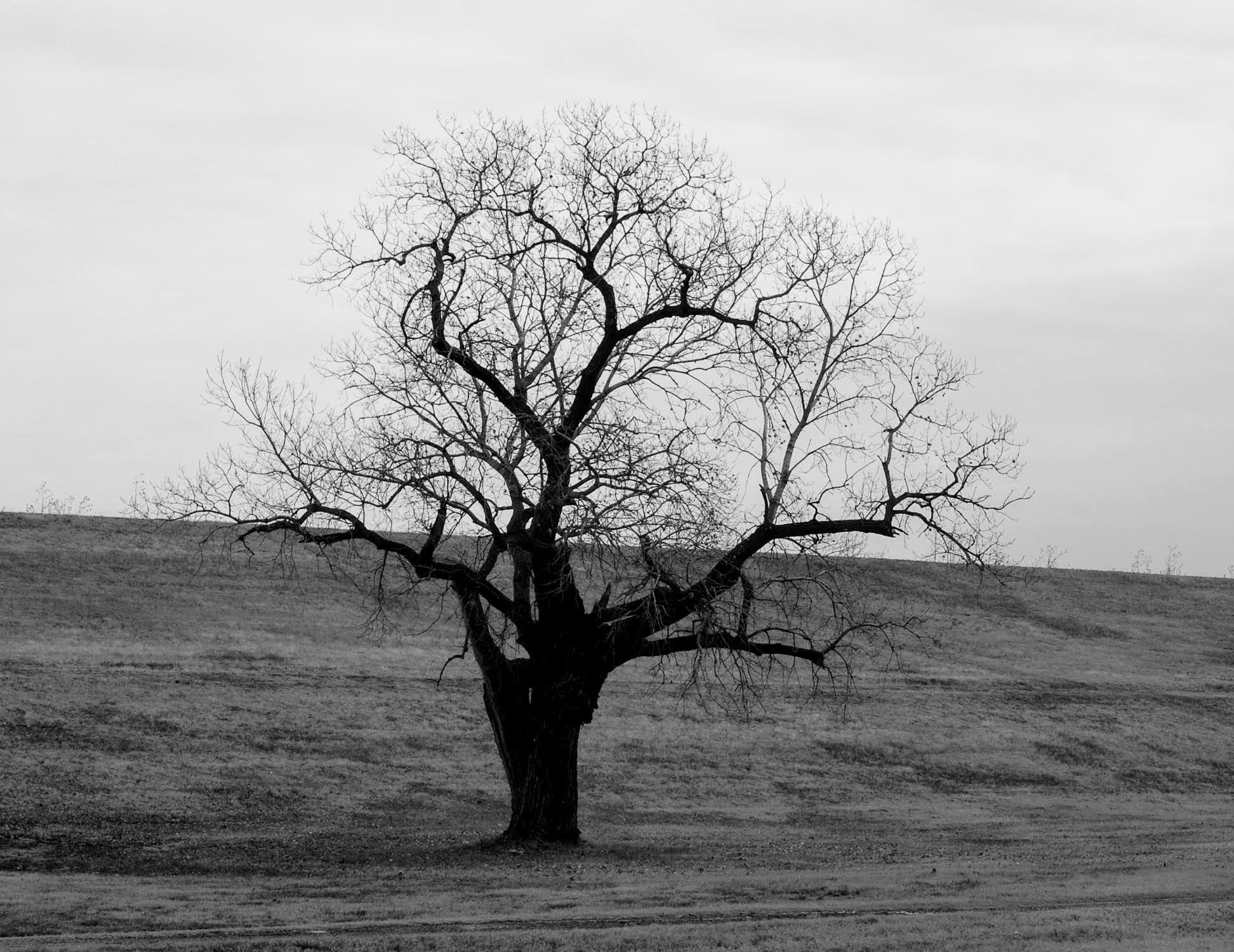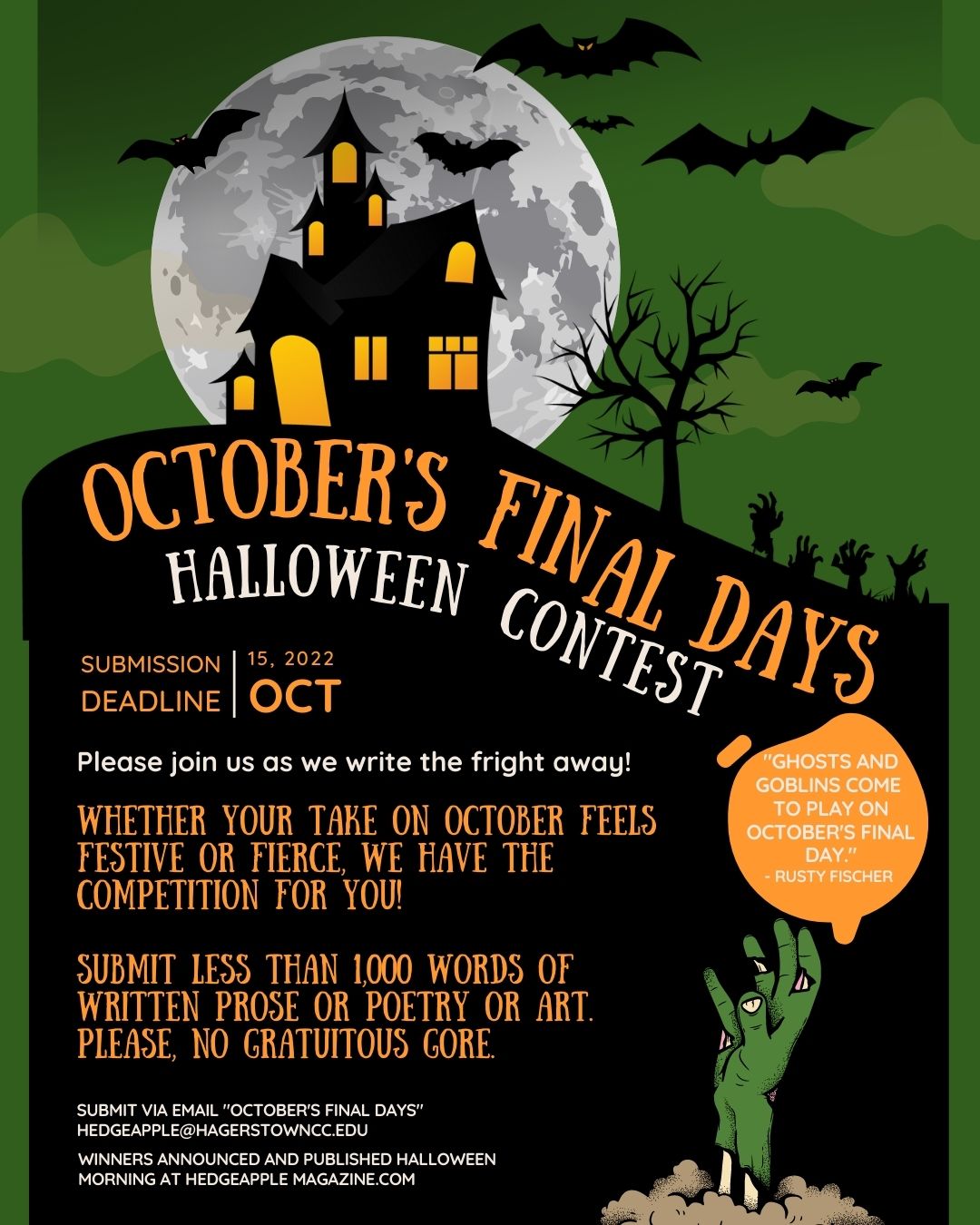October’s Final Days, Honorable Mention, Fiction
.
Every Halloween, Grandpa and me go trick-or-treating together.
This year I’m dressed as a necromancer, with black eyes and a big pretend nose and everything. The veil I’m wearing is my mum’s, the black one she wears for funerals and watching the horses; the gown is all ripped and hasn’t fit my sister since her accident, so she says I can have it; I borrowed the false nails from the cleaning lady at school (as long as I promise to give them back); and the skull, the one tucked under my arm, that’s Grandpa’s. (I wanted a cat, but we couldn’t catch one.)
Grandpa always dresses as a ghost. He jokes, “When you’re as old as I am, you don’t need a costume.” (He does really; it’s Granny’s bed sheet with two eyeholes ripped in the middle.) “If she isn’t lying on it, I might as well wear it.” Grandpa says the strangest things. But he says we’ll give all the residents a good fright tonight and get lots of treats. To help us see where we’re going, he’s brought a candle. The other ‘trickers’ on the streets prefer flashlights: lighter, brighter, and you don’t need to worry about tucking your sheet under your chin to stop it catching on fire. Also, when the weather’s gusty, a flashlight doesn’t blow out. But Grandpa is adamant:
“Candles don’t need batteries! And no, they don’t blow out, not if you keep your teeth together.”
Strange things…
At the end of our street there is a big house, with big windows and a big garden which goes all the way around. Mr. and Mrs. Bury live here, alone. Just like their house, they are both very big. “Which means they’ll have treats. Unless they’ve scoffed them all already, big buggers.”
With Grandpa keeping watch from his eyeholes, we sneak up to the front door. I call through the letterbox, “Trick or treat!” Heavy footsteps, the door opens, and we’re greeted by lounge light, the aroma of baking, and the big Mrs. Bury.
“Good gracious! A witch? At this hour?” she gasps, clasping her hand to her heart. “Words escape me! And what could be glowing under that sheet? A lantern?”
“It’s a ghost. A ghoooost,” I say in my best ghost voice. As a rule, Grandpa doesn’t waste his breath on strangers. Even when he’s a ghost. “And I’m not a witch,” I correct Mrs. Bury, “I’m a necromancer.”
“Are you now? Then you won’t want any treats. Necromancers don’t like treats. It’s poison to them. Everyone knows that.”
I didn’t.
“Such a pity,” Mrs. Bury sighs, “I’ve gone and wasted the entire afternoon baking sweet goodies for nothing. Oh well, I guess I’ll just have to throw them all–”
“No!” I shriek, lifting my veil and pretend nose. “It’s me, Jenny Hindley. From number thirty-three. Look!”
“Well, that changes things,” Mrs. Bury smiles, producing from behind her back a tray of steaming, golden-brown gingerbread men. “Go ahead, my dear, take as many as you like.”
I do. I really like gingerbread. “And so does my grandpa.”
“Then you must take some home for him. Wait there, I have a cookie jar you can borrow. It’s around here somewhere.”
“That’s okay, Mrs. Bury,” I say, pulling back the bed sheet and offering up Grandpa’s skull. “They’ll be safe in here.”
Mrs. Bury looks uncertain. “But there’s a candle in there, dear.”
“Oh, I’ll take it out.” I also extinguish the candle, just to be safe. Mrs. Bury still looks uncertain, even a little surprised, but, at my insistence, she begins filling the skull.
“When you next see your grandfather, be sure to ask him what he thinks of my gingerbread.”
“Why wait?”
I lift up the skull, and ask:
“Do you like Mrs. Bury’s gingerbread, Grandpa?”
Seeing that I’ve pressed Grandpa to my ear, as though he were a smelly old seashell, I explain to the very surprised Mrs. Bury, “He’s very old, and speaks very softly. He’ll only speak to me when no one’s– what’s that? Super delicious? Good and chewy, just the way you like it, so much so,” I turn to Mrs. Bury, “that Grandpa wants to take it all. Please.”
Mrs. Bury clutches her heart again; her big mouth is hanging open. Similarly, I open Grandpa’s jaw all the way until the bone makes a clicking sound, like the sound your finger makes when you pull it back too far. Grandpa doesn’t mind. “I’m used to it.” This doesn’t seem to reassure Mrs. Bury; even with my help she struggles to put all the little men into Grandpa’s mouth without dropping them, or knocking their little legs against Grandpa’s two remaining teeth. One of the teeth pops out and bounces down the path like a little rusty coin. When I comfort Grandpa with a kiss on his bullet hole, Mrs. Bury trembles uncontrollably.
“Are you cold, big lady?”
I reach inside Grandpa’s mouth, all the way in.
“Perhaps a nice warm gingerbread man would–”
“No, that’s alright, dear,” Mrs. Bury gulps, staring at me and Grandpa like she’s seen a ghost – like an actual ghost. “I’ll just go back inside. You run along, now. You and your…grandpa.”
“We will,” I call over my shoulder, skipping away down the path. “Say goodbye to Mrs. Bury, Grandpa.”
“Goodbye to Mrs. Bury, Grandpa,” he cackles, spitting gingerbread limbs all over her lawn. “Hey, don’t forget my tooth!”
Mrs. Bury latches the door. The curtains behind her big windows snap together. Me and Grandpa hurry along to the next house: Mr. and Mrs. Bannister. Like Mr. and Mrs. Bury, they are also childless. But they make tofu in the shape of eyeballs, Grandpa’s favourite. “You’ll have to chew’em for me, though.”
I can’t help but laugh.
“Grandpa, you’re so strange.”
Scott Tierney is an author of novels, short stories, the off-the-wall comic series, Pointless Conversations, and the off-the-crumpet super-hero series, Crumpet-Hands Man. He has also authored the novella, Kin.
Scott currently resides in the North West of England. Examples of his writings, and graphic design work, can be found at scotttierneycreative.com


